News
Registration Desk will be opened at 15:00 on September 14, 2014.The tentative technical program is now available.
Update history
[11 Sep. 2014] Social Events appears.
[9 Sep. 2014] Registration Desk information was added to Program Overview.
[3 Sep. 2014] Guidelines for Speakers appears.
[30 Aug. 2014] Plenary Talks appears.
[22 Jul. 2014] The tentative technical program is available.
[4 Jul. 2014] How to get to Luzern from Zurich airport appears.
[2 Jul. 2014] Program Overview appears.
[13 Jun. 2014] Venue, Invation letter and Accommodation pages appear. Click the left menu icons.
[3 Jun. 2014] Registration site has been opened! Early registration due is before/on June 30.
[3 Jun. 2014] Final on-line submission site has been opened.
[1 Apr. 2014] The deadline for submission of full papers has been extended to April 15.
[3 Mar. 2014] Paper submission page has been opened.
[26 Feb. 2014] Deadline for Special Session proposals has been extented.
[11 Nov. 2013] NOLTA 2014 webside has been pre-opened.
Author's Schedule
[15 Feb. 2014] Deadline for Special Session proposals
[1 Mar. 2014] Notification of acceptance for Special Sessions
[15 Apr. 2014][1 Apr. 2014] Deadline for submission of full papers for Regular and Special Sessions
[1 Jun. 2014] Notification of acceptance for Regular and Special Session Papers
[15 Jun. 2014] Deadline for submission of all camera-ready papers
Student Paper Award
The NOLTA2014 Symposium Committee will select a small number of papers to receive the Student Paper Award. Candidates are nominated by TPC of NOLTA2014 before the Symposium. The Candidates are asked to present the paper at the Symposium. The selection is based on the quality, originality, and clarity of the paper and the presentation.
How to get to Luzern from Zurich airport
Direct trains from Zurich airport to Luzern run every hour (usually at XX.47), travel time 1h. Tickets cost CHF 28 and can be bought at the train station in Zurich airport. For a detailed schedule, visit http://www.sbb.ch/en/home.html
Guidelines for Speackers
- Each speaker must contact the Session Chair in advance of the session. Please come to the session room at least five minutes before the start time.
- Each session room is equipped with a projector but no computer will be provided. Please bring your own laptop with you. We strongly recommend you to go to your session room and test your laptop with the projector in advance of the session.
- Presentation time is critical: each presentation is allocated 18 minutes including questions and answers. You should spend about 14-15 minutes for your presentation and leave 3-4 minutes for questions and answers. Any delay in preparation of your presentation will be included in your presentation time. In order to avoid unnecessary delay, please turn on your computer and start the presentation software before the previous presentation ends.
Plenary Talks

Toshimichi Saito
Japan
Logistic Map versus Digital Logistic Map
Abstract: The digital logistic map (DLM) is a digital dynamical system based on the logistic map (referred to as the analog logistic map (ALM) in this talk). As is well known, the ALM is a historical example of nonlinear dynamical systems: a very simple one-dimensional difference equation that can exhibit period doubling bifurcation and chaos. The DLM is a mapping from a set of lattice points to itself. Depending on the parameter and initial condition, the DLM can exhibit a variety of periodic orbits and transient phenomena. It should be noted that the DLM is not an approximation of the ALM. Discretizing the ALM, we obtain the DLM. Inversely, interpolating the DLM, we obtain the ALM. There exists no master-slave relationship between the DLM and ALM. Comparing the DLM with the ALM, we have obtained interesting results. For example, when the ALM has a unique stable periodic orbit, the DLM can have plural periodic orbits. The DLM exhibits either periodic orbit depending on the initial condition. When the ALM has an unstable period-3 orbit that causes chaotic behavior, the DLM can have a stable period-3 orbit with various transient phenomena. The DLM is fundamental to consider interesting digital dynamical systems such as cellular automata and digital spiking neurons. Engineering applications of such digital dynamical systems are many, including time-hopping UWB signal generators and reconfigurable control signal generators of switching circuits.

Leonid Bunimovich
USA
Isospectral Transformations: a New Approach to Analysing Multidimensional Systems and Networks
Abstract: Recently, a new approach to the analysis of networks has been developed, which allows one the ability to compress a network while preserving all information relative to the network's spectrum. Along with these compression techniques, a number of other isospectral transformations have been developed, that can be applied to gain new results in a number of areas. This includes the stability of time-delayed and non time-delayed dynamical networks, eigenvalue estimation, pseudospectra analysis, and the estimation of survival probabilities in open dynamical systems. In fact, so far, each attempt at applying this approach has been successful, yielding new concepts and results. Moreover, this theory of isospectral transformations can be readily applied in any area that involves the analysis of multidimensional systems and is especially applicable to the analysis of network dynamics of any (directed or undirected, weighted or unweighted, etc) network.
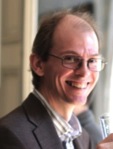
Johan Suykens
Belgium
Kernel-Based Modelling for Complex Networks
Abstract: With respect to coupled dynamical systems, synchronization, hierarchical clustering and community detection in complex networks, the Laplacian matrix often plays a central role in the analysis, e.g. in spectral clustering methods. In this talk we propose a kernel-based setting for characterizing spectral clustering problems, which provides different underlying model representations. It is shown how this enables making out-of-sample extensions, extracting representative subgraphs, incorporating prior knowledge and handling large scale problems. For working with sparse kernel models in clustering, regression and time-series prediction problems, fixed-size kernel models are proposed. Successful applications are shown for multilevel hierarchical clustering and community detection in complex networks, power load forecasting and customer profiling, and PM10 concentrations pollution modelling. Finally, multitask learning in reproducing kernel Hilbert spaces with spectral regularization is demonstrated for black-box weather forecasting.

Stefano Boccaletti
Italy
Explosive synchronization in complex networks
Abstract: During the last fifteen years, complex network theory has successfully portrayed the interaction among the constituents of a variety of natural and man-made systems. In particular, a great interest has been devoted to the emergence of collective dynamical processes on top of complex topologies characterizing the system's unit-unit interactions. Possibly, the most studied collective dynamics in complex networks is synchronization, as such a state play a crucial role in many relevant phenomena like, just to mention a couple of examples, the emergence of coherent global behaviors in both normal and abnormal brain functions, or the food web dynamics in ecological systems. In this talk, I show that the transition to a graph's synchronous evolution may have either a reversible, or an irreversible nature. The former case is what traditionally investigated in coupled phase oscillators, where a second-order phase transition characterizes the passage from the incoherent to the coherent state of the ensemble. The latter, instead, corresponds to a discontinuous transition, called explosive synchronization (ES). Based on Kuramoto oscillators, ES has rapidly become a subject of enormous interest. While originally it was suggested that ES was due to a positive correlation between the natural frequencies of oscillators and the degrees of nodes, I will discuss several unifying frameworks leading to emergence of ES for generic frequency distributions, and generic connectivity topologies.
Alain Arnéodo
France
Wavelet-Based Multi Fractal Analysis of Dynamic Infrared Thermograms and X-Ray Mammograms to Assist in Early Breast Cancer Diagnosis
Abstract: Breast cancer is the most common type of cancer among women and despite recent advances in the medical field, there are still some inherent limitations in the currently used screening techniques. The radiological interpretation of X-ray mammograms often leads to over diagnosis and, as a consequence, to unnecessary traumatic and painful biopsies. First we use the 1D Wavelet Transform Modulus Maxima (WTMM) method to reveal changes in skin temperature dynamics of women breasts with and without malignant tumour. We show that the statistics of temperature temporal fluctuations about the cardiogenic and vasomotor perfusion oscillations do not change across time-scales for cancerous breasts as the signature of homogeneous monofractal fluctuations. This contrasts with the continuous change of temperature fluctuation statistics observed for healthy breasts as the hallmark of complex multifractal scaling. When using the 2D WTMM method to analyse the roughness fluctuations of X-ray mammograms, we reveal some drastic loss of roughness spatial correlations that likely results from some deep architectural change in the microenvironment of a breast tumor. This local breast disorganisation may deeply affect heat transfer and related thermomechanics in the breast tissue and in turn explain the loss of multifractal complexity of temperature temporal fluctuations previously observed in mammary glands with malignant tumour. These promising findings could lead to the future use of combined wavelet-based multifractal processing of dynamic IR thermograms and X-ray mammograms to help identifying women with high risk of breast cancer prior to more traumatic examinations. Besides potential clinical impact, these results shed a new light on physiological changes that may precede anatomical alterations in breast cancer development.

Fred Wolf
Germany
Singularities in the Brain: How Self-Organization Shapes the Evolution of Neuronal Circuits
Abstract: (Comming Soon)
Accommodation
Lucerne offers a wide range of accommodation options that are suitable for the conference. In general, all hotels in the city center of Lucerne are within walking distance of the conference venue (KKL Luzern / Bourbaki Panorama). Since September will be a busy time in Lucerne, we advise people to book early.
Special Conditions for NOLTA 2014
The following hotels provide special conditions for NOLTA 2014 participants (booking via email).
HOTEL DE LA PAIX / HOTEL AMBASSADOR
Address: Museggstrasse 2, Luzern / Zürichstrasse 3, Luzern
URL: http://www.de-la-paix.ch/
email: de-la-paix@ambassador.ch
Single room: CHF 139 / night
Double room: CHF 218 / night
(incl. breakfast, excl. city tax)
Booking code: "NOLTA2014"
TOURIST HOTEL
Address: St.-Karli-Quai 12, Luzern
URL: http://touristhotel.ch/
email: info@touristhotel.ch
Single room: CHF 140 / night
Double room: CHF 160 / night
(incl. breakfast, excl. city tax)
Booking code: "ETH Zürich 0914"
IBIS BUDGET (*)
No vacancies
Address: Kellerstrasse 4, Luzern
URL: http://www.accorhotels.com/en/hotel-6782-ibis-budget-luzern-city/index.shtml
email: H6782-BO@accor.com
Single room: CHF 111.95 / night
Double room: CHF 127.90 / night
3-bed room: CHF 138.85 / night
(incl. breakfast and taxes)
Booking code: "NOLTA 2014, reservation no. 105723"
(*) 20 rooms are reserved for NOLTA participants until 13/08/2014
OTHER RECOMMENDED OPTIONS
Luxury
Palace Hotel
https://www.palace-luzern.ch
Grand Hotel National
http://www.grandhotel-national.com
Hotel Schweizerhof
http://www.schweizerhof-luzern.ch/
Mid-range
Hotel Continental Park
http://www.continental.ch
IBIS Styles
http://www.accorhotels.com/en/hotel-8549-ibis-styles-luzern-city/index.shtml
Hostel
Backpackers Lucerne
https://www.backpackerslucerne.ch/index_en.php
Call for Papers
PDF version
Call for Papers of PDF version is here.
First Call for Papers
The 2014 International Symposium on Nonlinear Theory and its Applications (NOLTA 2014) will be held September 14 E8, 2014 in Luzern, Switzerland. The objective of the symposium is to provide a forum for exchange of the latest results related to nonlinear theory and its applications. Papers describing original results in all aspects of nonlinear theory and its applications are invited. Topics include, but are not limited to:
| Chaos and Bifurcation | Chaotic Neural Networks | Circuits and Systems |
| Cellular Neural Networks | Oscillations | Self-Validating Numerics |
| Synchronization | Learning and Memory | Modeling and Simulation |
| Coupled Oscillators | Prediction and Identification | Large-Scale Networks |
| Communication | Image and Signal Processing | Analog and Digital ICs |
| Chua’s Circuits | Neuro Dynamics | Distributed Networks |
| Control | Evolutionary Computation | Power Systems |
| Complex Systems | Optimization | Robotics |
| Complex Networks | Fractals | Fuzzy Systems |
| Optics | Solitons | Biocybernetics |
| Chemistry | Applied Mathematics | Economics |
| Physics | Biomedical Data Processing | Biomedical Engineering |
| Bioinformatics |
Paper Submission
Submission site is here. (under construting.)
Invitation Letter
If you need an invitation letter from the NOLTA symposium in order to get visa to Switzerland, please email to the symposium desk nolta14@keiei.shikoku-u.ac.jp.
Conference Registration
Conference Registration Fees
[We accept only Japanese Yen(JPY)]
| Regular | Student | |
| Early registration ( - Jun. 30) | 55,000JPY | 35,000JPY |
| Late registration ( Jul. 1 - Aug. 25 ) | 70,000JPY | 45,000JPY |
| On-Site ( Aug. 26 - ) Accept CASH Only! (no credit card) | 70,000JPY | 45,000JPY |
| Additional ticket | 15,000JPY /person | |
Registration to the conference includes:
- Access for All Sessions
- Events
- Welcome Reception
- Coffee Break
- Conference Dinner
- Farewell Party
- Conference USB-Memory with proceedings.
Registration Page
Registration Page was closed.
Additional Ticket Information
Additional Ticket is valid for welcome reception, conference dinner and farewell party. Note that it is invalid for accessing conference sessions.
Cancellation Policy
No Refund.
Program overview
| Date | Place | Time | Program |
|---|---|---|---|
| Sep. 14 (Sun) | Bourbaki | 15:00 | Registrtion Desk is opened. |
| 17:00--20:00 | Welcome Reception | ||
| Sep. 15 (Mon) | KKL | 8:30--9:00 | Opening Ceremony |
| 9:00--12:00 | Plenary Session (2-3 talks) | ||
| 12:00--13:30 | Lunch | ||
| Bourbaki | 13:30--15:00 | Regular and Special Sessions | |
| 15:00--15:30 | Coffee Break | ||
| 15:30--17:00 | Regular and Special Sessions | ||
| Sep. 16 (Tue) | KKL | 9:00--12:00 | Plenary Session (2-3 talks) |
| 12:00--13:30 | Lunch | ||
| Bourbaki | 13:30--15:00 | Regular and Special Sessions | |
| 15:00--15:30 | Coffee Break | ||
| 15:30--17:00 | Regular and Special Sessions | ||
| Sep. 17 (Wed) | Bourbaki | 8:30--10:00 | Regular and Special Sessions |
| 10:00--10:30 | Coffee Break | ||
| 10:30--12:00 | Regular and Special Sessions | ||
| 12:00--13:30 | Lunch | ||
| Bourbaki | 13:30--15:00 | Regular and Special Sessions | |
| 16:00--22:30 | Excursion and Banquet | ||
| Sep. 18 (Thu) | Bourbaki | 8:30--10:00 | Regular and Special Sessions |
| 10:00--10:30 | Coffee Break | ||
| 10:30--12:00 | Regular and Special Sessions | ||
| 12:00--13:30 | Lunch | ||
| Bourbaki | 13:30--15:00 | Regular and Special Sessions | |
| 15:30-- | Farewell Ceremony | ||
| * Lunch is not included in the registration fee. | |||
Registration Desk
| September 14 | 15:00-17:00 | Entrance Hall, Bourabaki Kino |
| September 15 | 08:00-12:00 | Convention Centre Wing A, KKL Luzern |
| 13:30-17:00 | Entrance Hall, Bourabaki Kino | |
| September 16 | 08:00-12:00 | Convention Centre Wing A, KKL Luzern |
| 13:30-17:00 | Entrance Hall, Bourabaki Kino | |
| September 17 | 08:00-15:00 | Entrance Hall, Bourabaki Kino |
| September 18 | 08:00-15:00 | Entrance Hall, Bourabaki Kino |
Organizer
Organizer
Research Society of Nonlinear Theory and its Applications, IEICE
In cooperation with
Technical Group on Nonlinear Problems, IEICE
Technical Group on Circuits and Systems, IEICE
Symposium Committee
General Chairs
 Ruedi Stoop (Uni/ETH, Zurich) |
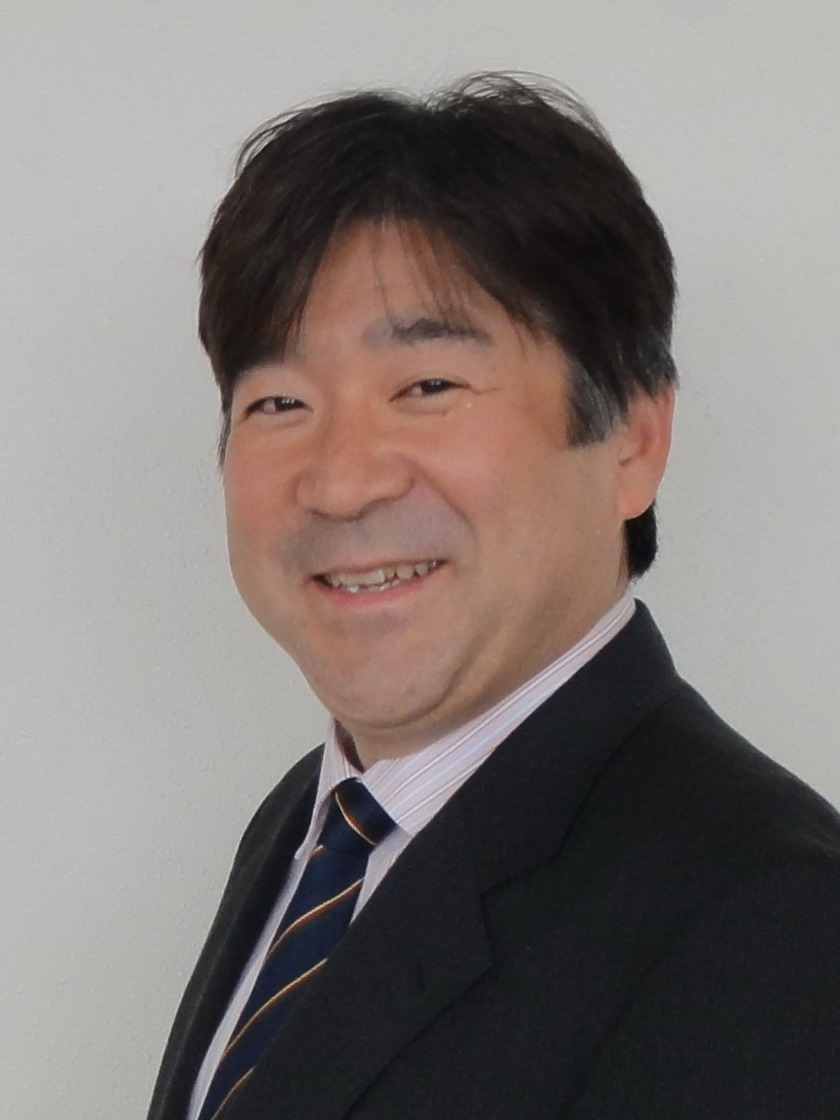 Yoshifumi Nishio (Tokushima Univ.) |
Honorary Chair
Martin Hasler (EPFL)
Technical Program Chairs
 Hans Herrmann (ETH Zurich) |
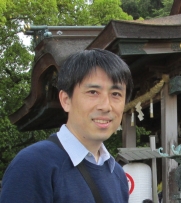 Norikazu Takahashi (Okayama Univ.) |
Special Session Chairs
Francis Lau (Hong Kong Polytechnic Univ.)
Tetsushi Ueta (Tokushima Univ.)
Finance Chairs
Markus Christen (ETH Zurich)
Masahiro Wada (Konan Univ.)
Publication Chair
Yasuteru Hosokawa (Shikoku Univ.)
Publicity Chair
Hisato Fujisaka (Hiroshima City Univ.)
Local Arrangement Chairs
Thomas Ott (Zurich Univ. of Applied Sciences)
Florian Gomez (ETH Zurich)
General Secretaries
Stefan Martignoli (Rapperswil Univ. of Applied Sciences)
Yoko Uwate (Tokushima Univ.)
Technical Program Committee
José Soares Andrade
(Federal University of Ceará)
Nuno Araujo
(ETH Zurich)
Tetsuya Asai
(Hokkaido University)
Fernando Corinto
(Polytechnic University of Turin)
Sergio Callegari
(University of Bologna)
Lucilla de Arcangelis
(Second University of Naples)
Hiroshi Fujisaki
(Kanazawa University)
Zbigniew Galias
(AGH University of Science and Technology)
Jason Gallas
(Federal University of Paraíba)
Yoshihiro Hayakawa
(Sendai National College of Technology)
Michael Herrmann
(University of Edinburgh)
Yoshito Hirata
(University of Tokyo)
Takashi Hisakado
(Kyoto University)
Janos Kertesz
(Central European University)
Hiroyuki Kitajima
(Kagawa University)
Rainer Klages
(Queen Mary University of London)
Heinz Koeppl
(Technical University of Darmstadt)
Keiji Konishi
(Osaka Prefecture University)
Vladimir Konotop
(University of Lisbon)
Takuji Kousaka
(Oita University)
Jürgen Kurths
(Potsdam Institute for Climate Impact Research)
Hernan Makse
(City College of New York)
Hiroya Nakao
(Tokyo Institute of Technology)
Takeshi Ogita
(Tokyo Woman's Christian University)
Hiroo Sekiya
(Chiba University)
Michael Small
(University of Western Australia)
Marco Storace
(University of Genova)
Yoshihiko Susuki
(Kyoto University)
Yuichi Tanji
(Kagawa University)
Isao Tokuda
(Ritumeikan University)
Hiroyuki Torikai
(Kyoto Sangyo University)
Akio Tsuneda
(Kumamoto University)
Mustak Yalcin
(Technical University of Istanbul)
Link
IEICE
NOLTA Symposia
- NOLTA2013 : Santa Fe, USA, Sept. 8 - 12, 2013.
- NOLTA2012 : Palma, Majorca, Spain, Oct. 22 - 26, 2012.
- NOLTA2011 : Kobe, Japan, Sep. 4 - 7, 2011. (the site is no longer available.)
- NOLTA2010 : Krakow, Poland, Sept. 5 - 8, 2010.
- NOLTA2009 : Sapporo, Japan, Oct. 18 - 21, 2009.
- NOLTA2008 : Budapest, Hungary, Sept. 7 - 10, 2008.
- NOLTA2007 : Vancouver, Canada, Sept. 16 - 19, 2007.
- NOLTA2006 : Bologna, Italy, Sept. 11 - 14, 2006.
- NOLTA2005 : Bruges, Belgium, Oct. 18 - 21, 2005.
- NOLTA2004 : Fukuoka, Japan, Nov. 29 - Dec. 3, 2004.
- NOLTA2003 : Canceled.
- NOLTA2002 : Xi'an, China, Oct. 7 - 11, 2002.
- NOLTA2001 : Miyagi, Japan, Oct. 28 - Nov. 1, 2001.
- NOLTA2000 : Dresden, Japan, Sept. 17 - 21, 2000.
- NOLTA'99 : Hawaii, USA, Nov. 28 - Dec. 2, 1999.
- NOLTA'98 : Crans-Montana, Switzerland, Sept. 14 - 17, 1998.
- NOLTA'97 : Hawaii, USA, Nov. 29 - Dec. 3, 1997.
- NOLTA'96 : Kochi, Japan.
- NOLTA'95 : Las Vegas, USA.
- NOLTA'94 : Ibusuki, Japan.
- NOLTA'93 : Hawaii, USA.
- NOLTA'92 : Kanagawa, Japan.
- NOLTA'91 : Fukuoka, Japan.
- NOLTA'90 : Hawaii, USA.
Contact Us
E-mail: nolta14@keiei.shikoku-u.ac.jp
Venue
KKL Luzern (Plenary Talks)
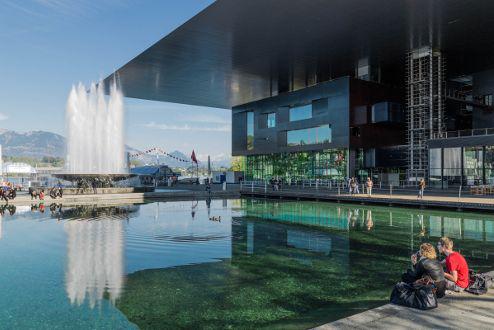
Official web site is here
Cinema of Bourbaki Panorama (Regular and special Sessions)
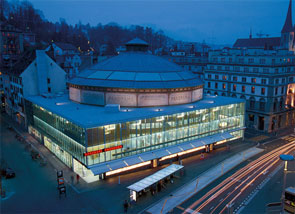
Both places are conveniently located in the city center.
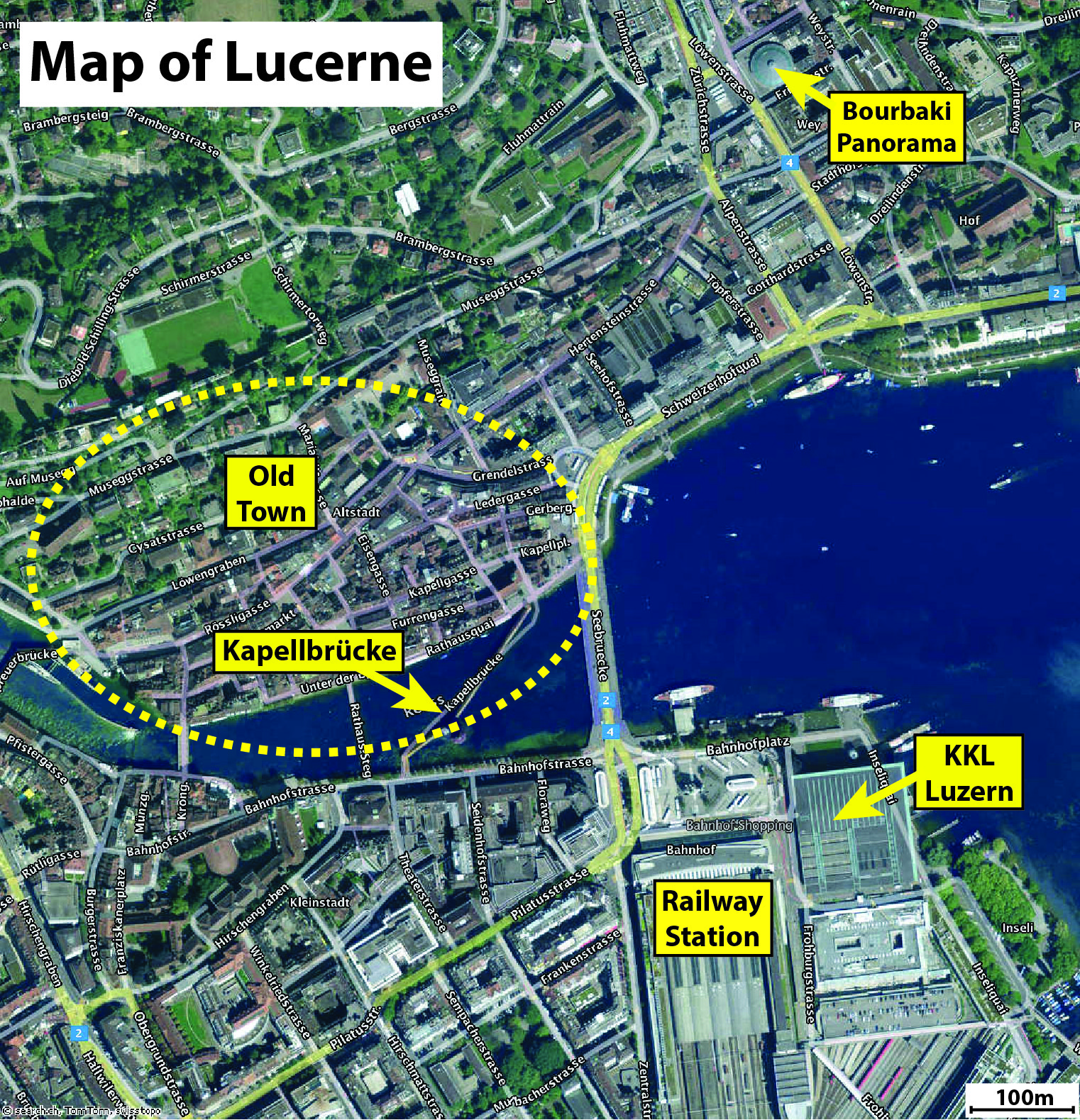
Registration Desk
| September 14 | 15:00-17:00 | Entrance Hall, Bourabaki Kino |
| September 15 | 08:00-12:00 | Convention Centre Wing A, KKL Luzern |
| 13:30-17:00 | Entrance Hall, Bourabaki Kino | |
| September 16 | 08:00-12:00 | Convention Centre Wing A, KKL Luzern |
| 13:30-17:00 | Entrance Hall, Bourabaki Kino | |
| September 17 | 08:00-15:00 | Entrance Hall, Bourabaki Kino |
| September 18 | 08:00-15:00 | Entrance Hall, Bourabaki Kino |
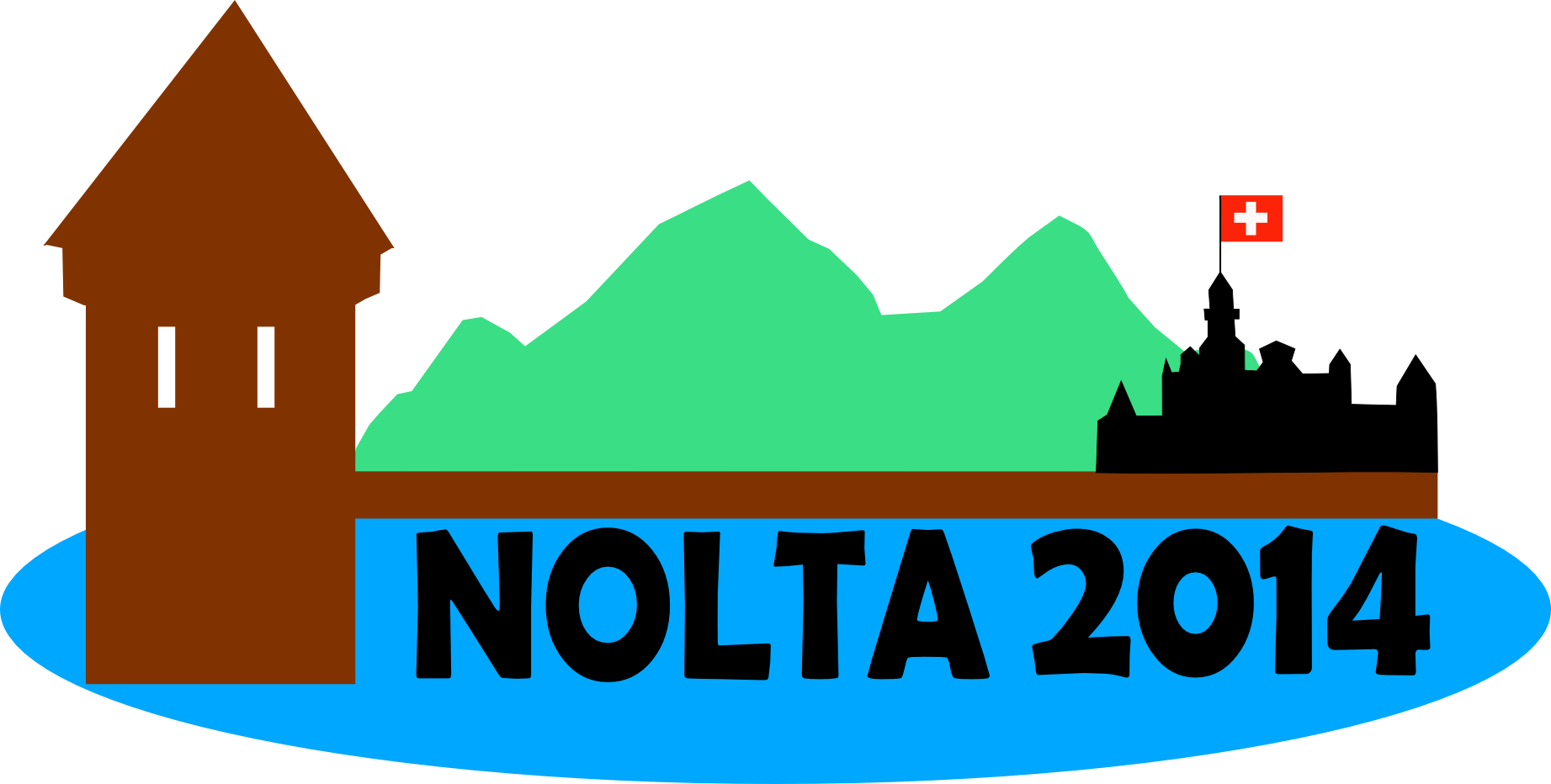
Social Events
Student Award Ceremony
Schedule of Excursion and Banquet
(Septermber 17)
(IMPORTANT: DO NOT BE LATE!)